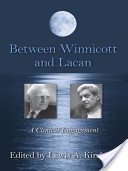Lewis A. Kirshner, MD
New York: Routledge, 2011
D. W. Winnicott and Jacques Lacan, two of the most innovative and important psychoanalytic theorists since Freud, are also seemingly the most incompatible. And yet, in different ways, both men emphasized the psychic process of becoming a subject or of developing a separate self, and both believed in the possibility of a creative reworking or new beginning for the person seeking psychoanalytic help. The possibility of working between their contrasting perspectives on a central issue for psychoanalysis – the nature of the human subject and how it can be approached in analytic work – is explored in this book. Their differences are critically evaluated, with an eye toward constructing a more effective psychoanalytic practice that takes both relational and structural-linguistic aspects of subjectivity into account. The contributors address the Winnicott-Lacan relationship itself and the evolution of their ideas, and provide detailed examples of how they have been utilized in psychoanalytic work with patients.
About the Author: Lewis Kirshner, M.D., is Clinical Professor of Psychiatry, Harvard Medical School, and Training and Supervising Analyst, BPSI. He is the author of Having a Life: Self Pathology after Lacan (Analytic Press, 2003), and has led workshops and meetings of the American Psychoanalytic and International Psychoanalytical Associations on “Working between Winnicott and Lacan.”
Contributors: Jeanne Wolff Bernstein, James Gorney, Andre Green, Mardi Ireland, Lewis Kirshner, Deborah Luepnitz, Mari Ruti, Alain Vanier, Francois Villa.


